Originally published on June 15, 2017
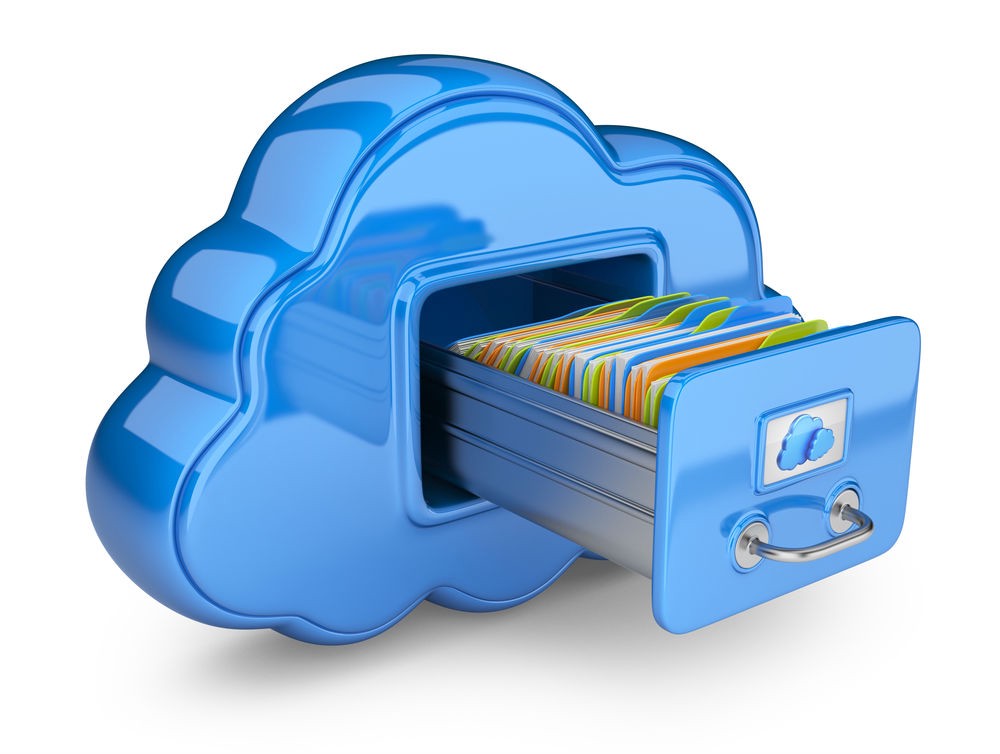
38th in a series of 50 Knowledge Management Components (Slides 49, 102, and 103 in KM 102)
Archiving: offline file storage for legal, audit, or historical purposes, using tapes, CDs, or other long-term media. Archiving is the process of moving files that are no longer actively used to a separate storage device for long-term retention. Archived files are still important to the organization and may be needed for future reference or must be retained for regulatory compliance. Archives should be indexed and searchable so that files can be easily located and retrieved.
As part of the lifecycle of information, archiving is an important final stage. Keeping too much old information available online consumes valuable storage which could be better used for newer information, increases the number of irrelevant search results returned, and adds to the effort required to maintain, migrate, and reclassify content.
There are good reasons to archive content rather than simply delete it. Laws may require content to be kept for specific periods. Internal and external audits may require document retention. Preserving information as a part of history is another worthy goal. And there are times when information which had been thought to be no longer useful later turns out to be needed. Archiving information addresses each of these requirements.
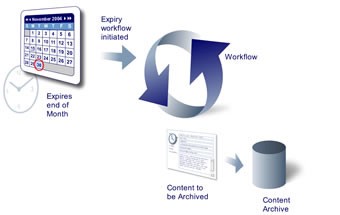
Document management: tracking and storing electronic documents and/or images of paper documents, keeping track of the different versions modified by different users, and archiving as needed. A document management system (DMS) is technology that provides a comprehensive solution for managing the creation, capture, indexing, storage, retrieval, and disposition of the records and information assets of an organization.
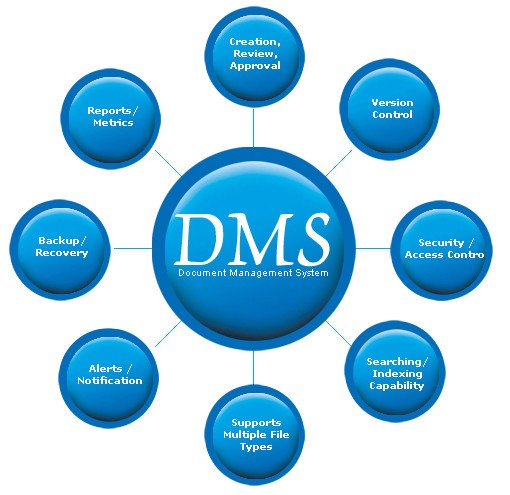
Records management: maintaining the records of an organization from the time they are created up to their eventual disposal; this may include classifying, storing, securing, archiving, and destroying records. Records management is knowing what you have, where you have it, how long you have to keep it and how secure it is.
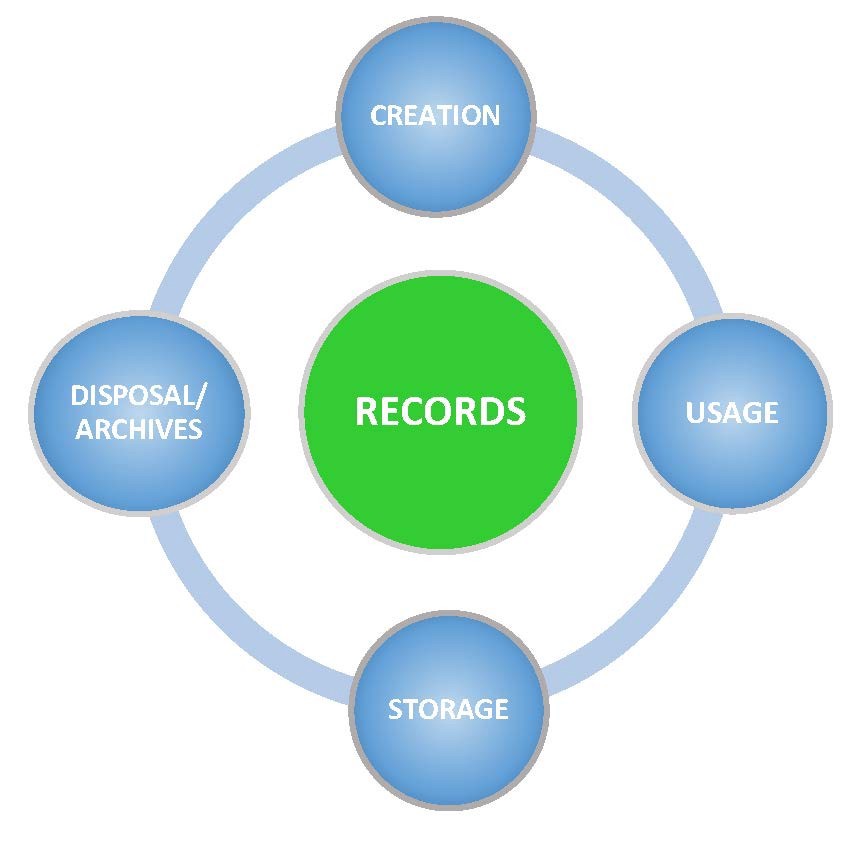
Examples of Processes, Policies, and Procedures
1. Document Management Process: The ideal information lifecycle management process provides an easy method for content to be reviewed, with the reusable content preserved and the other content archived on suitable media. For example, at the end of a project, all documents in the project team space are listed, the user checks boxes for the reusable ones, and then clicks on an archive button. The result is that the reusable documents are extracted from the team space and stored in the appropriate repository using the associated metadata, and all other documents are archived to a CD which is then stored in the specified archive library.
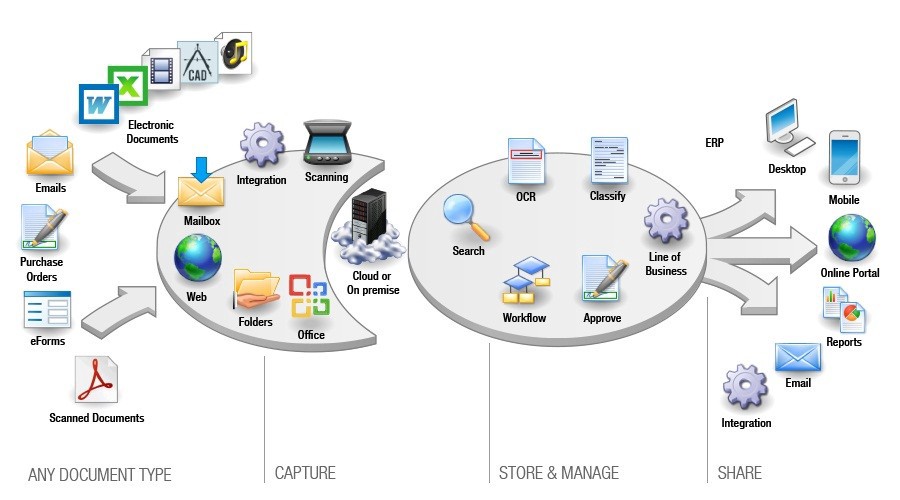
2. Records Management Policy: defines the policy for how the organization?s business records are to be managed
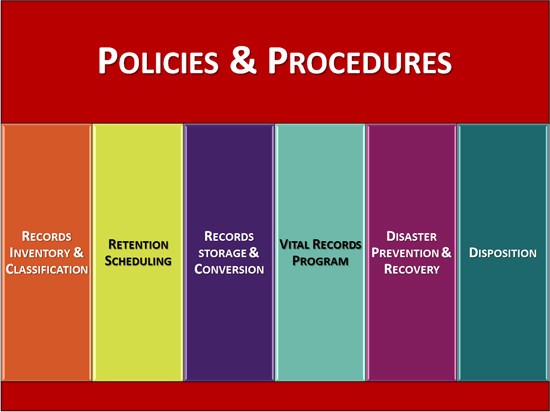
3. Archiving Procedure: details the steps to follow in support of the records management policy?s archiving rules
a. Example: HP
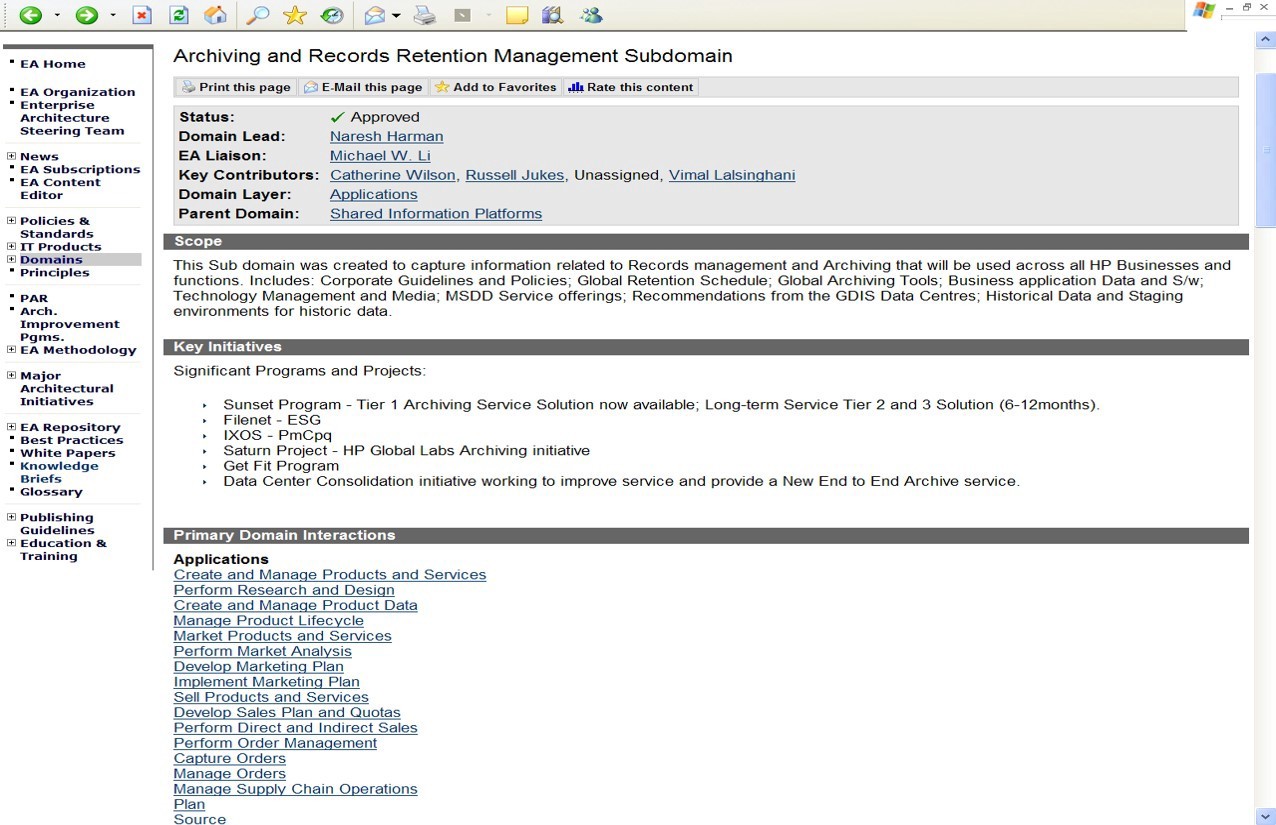
b. Example: Deloitte
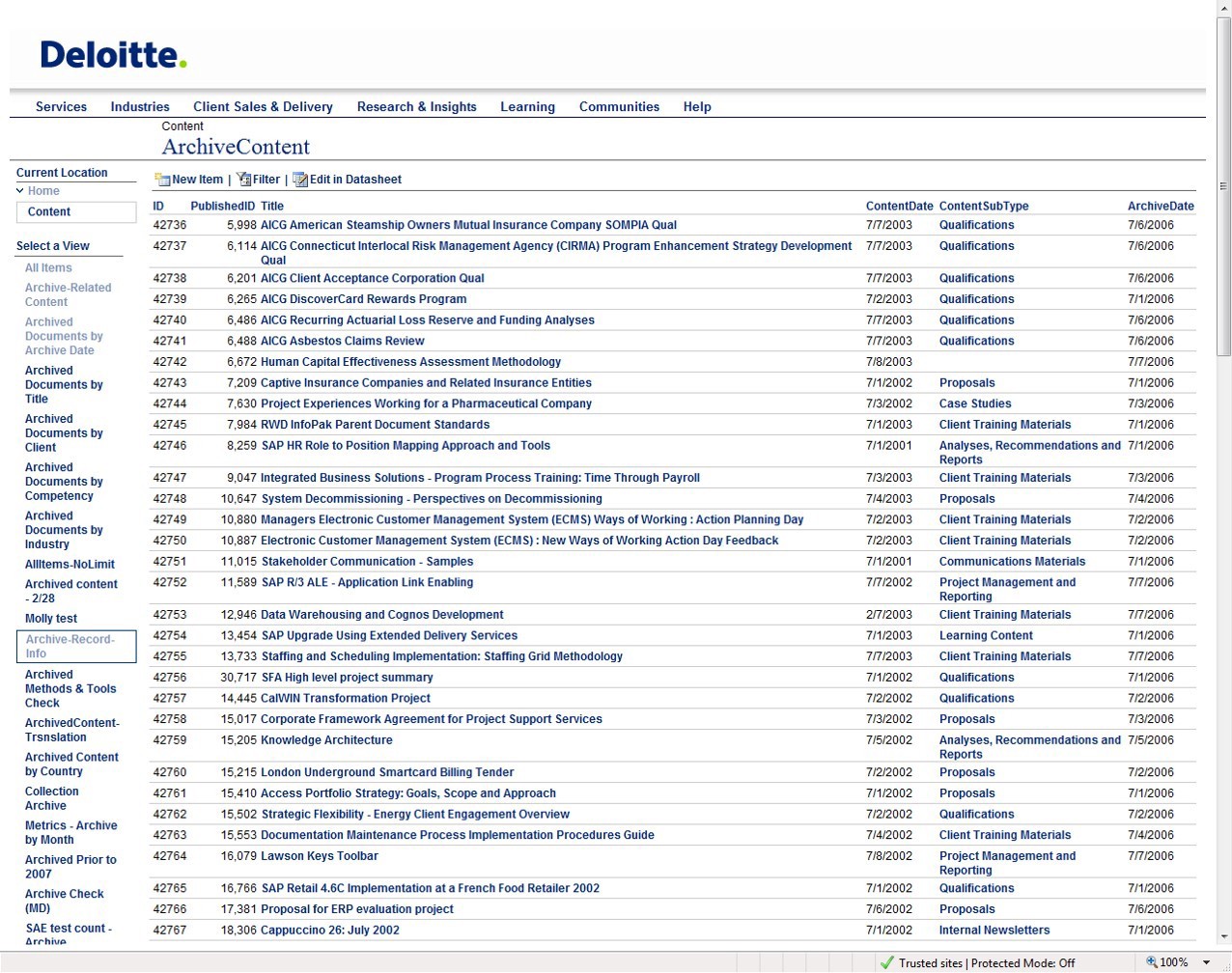
Insights
1. Information and Records Management Policy Development Guidelines by Patrick Lambe and Marita Keenan
The requirements for a knowledge sharing system, including taxonomy and metadata requirements, will need to be balanced with the need to manage records according to legislative and regulatory requirements. Knowledge, information and records form a continuum that needs to be managed holistically, and an integrated policy framework helps to support this.
2. Knowledge Management and document management/ECM by Nick Milton
Document management is a subset of information management. Document management covers the management of electronic documents, whether they are knowledge or not. Knowledge Management covers the management of knowledge, some of which may be codified within documents. There is an overlap between the two, as well as distinct separate areas.
4. Call me cynical but ? by Euan Semple
Document management systems ? where knowledge goes to die gracefully.
5. Complex Adaptive Processes on a Wiki? by Dave Snowden
The problem with wikis has always been the collapse of two essentially different operations: Save and Publish. You edit and save a page. What happens? You publish to the world. No approval. No chance to ensure it marries up with process changes made elsewhere, compare to compliance or governance regulations, to get it buy-in from stakeholders or to get legal approval. As a rule Wikis omit Content Management and Workflow capabilities and, because they don?t deal with Approved Records, they also lack Records Management and Records Retention facilities.
6. Ensuring Future Access to History by David Weinberger
As early as the 1940s, archivists were talking about machine-readable records. The debates and experiments have been going on for many decades. One early approach was to declare that electronic records were not archives, because the archives couldn?t deal with them. (Archivists and records managers have always been at odds, he says, because RM is about retention schedules, i.e., deleting records.) Over time, archivists came up to speed. By 2000, some were dealing with electronic records. In 2010, many do, but many do not. There is a continuing debate.
There are three languages we need: Legal, Records Management, and IT. How do we make the old ways work in the new? We need both new filtering techniques, but also traditional notions of appraisal.
7. SIKM Leaders Community Discussions
a. Archiving Content
Question: An IT colleague is proposing that we archive content more than 6 months old (still searchable) and that content more than 12 months be removed (owner will get an email alert). Should we do this?
Answers:
- From Howie Cohen: I suggest that you work with your compliance team. There are legal considerations for records management and retention that vary based on company and industry. IT people may have ideas but more often than not we don?t know the laws or the rules. In my practice, I always work with legal, corp comm, HR and compliance.
- From Chuck Georgo: Is the desire for archiving driven by storage space limitations or internal retention policies? The former can be resolved with helping to support the purchasing of more storage, the latter will be tricky as they may not want to retain certain content past a certain time period. You might also try filtering the content to only retain that which can be most useful.
- From Paul McDowall: Archiving makes a lot of sense for a field that changes and grows, but arbitrary rules for archiving are good for records managers and IT managers and often not so good for practitioners. The rules have to make sense for the practitioners first and foremost, assuming of course that there are no explicit legal reasons for the archiving rules.
- From Tammy Bearden: This may depend on the volume, value, and visibility of the content. Can you quantify its value and therefore it?s need for visibility? If you cannot get IT to budge and the retention/re-use value is still high, you may consider converting the ?expiring? content into wiki entries or another type record in a knowledge bank or in a work product collection.
b. CoP ? Archiving and Retention Policy
Question: We are considering migrating content to a searchable archive after 12 months then purging content at 6 years. Is that reasonable? How are people doing this?
Answer from Lee Romero: Retiring A Community And Capturing Its Knowledge
c. Should a KM group be responsible for Records Management?
d. Answer from Murray Jennex: Email retention policies and email archive best practices
8. Don?t automatically archive content; improve search instead
Knowledge repositories often are configured to automatically archive documents after some predetermined period of time. The intent is that after content has been available for 90 days (or whatever duration is chosen) it is no longer current and thus should be removed from the repository. The assumption is that this old content should not appear in search results or in lists of available documents.
Reasons include:
- Old documents are no longer relevant, accurate, or useful.
- Searches yield too many results, so weeding out old documents will improve user satisfaction with search.
- Content contributors should refresh documents periodically.
Contributed content does not automatically become obsolete after a fixed period of time. It may remain valuable indefinitely.
I offer the analogy that just because Peter Drucker died in 2005, we don?t remove his books from the library. His insights will continue to be useful for a very long time.
One firm where I worked had an automatic archiving process. As a result, I would often receive messages from frustrated users who were searching for content that they had previously found in the repository but could no longer find. I would have to restore this content from the archive to the active repository. This caused users to be annoyed with the KM program, resulted in a lot of wasted time and effort, and sometimes delayed the retrieval of important information needed for client work.
In Knowledge management and innovation, Steve Denning wrote: ?The quality of knowledge does not depend on whether it is old or new but rather whether it is relevant, whether it still works. Whether it is old or new hardly matters. The question is: does it work? The dynamic of academia is different. Here the new is celebrated, whether it is useful or not. The old is looked down on, not because it isn?t useful, but because the raison d?etre of academia is to create the new, not the useful. Innovation in industry will often draw on lessons from the past, particularly those that have been forgotten, or those that can be put together in new combinations to achieve new results. The bottom line however is not whether the knowledge is new, but whether it works in practice.?
With the cost of mass storage steadily decreasing, there are few good reasons to remove content from knowledge repositories unless it is known to be outdated, incorrect, or useless. Instead, allow search engines to limit results based on dates and other metadata to help users more easily find the content they need.
Don?t automatically archive content in a knowledge repository, threaded discussion, or other collection of knowledge. Instead, ensure that the search engine can limit results by the date of the knowledge object. Defaults can be set to limit results to the last 90 days, one year, or whatever duration is desired. But it should be easy for users to change the date range to include older content in the search results.
Also, allow content to be tagged with ?recommended? or ?good example? or ?proven practice? by an authoritative source, and by users with ?I found this useful? or with a ?Like? button. Then allow searching by date, tag attribute, most-liked by users, etc. See Content rating is different behind the firewall for more on recommended tags.
Resources
- Content Management Process
- DMS vs. ECM: The Difference Between Content & Document Management by NE Docs
- Why Document Management is not Records Management by NE Docs
- Content Life: The Art of Archiving by Paul Chin
- ?The Dog Ate My Homework? and Other Poor Excuses for Not Archiving by Sean Ragan
- Records and Archiving Join the Information Management Table by Andy Moore
- Archiving as the Cornerstone for E-Discovery: Five Steps Forward by Sean Ragan
- Enterprise social network archiving and good information governance by Jordan Richardson
- How to Implement Document Management Software by Julia Scavicchio
- How to implement Document Management System in SharePoint using Content Typesby Gregory Zelfond
- Getting started with document management: Cut costs and boost productivity with a smart document management system by Todd Johnson
- Records management software wish list: The 10 must-have features by Steve Weissman
- Records Management ? Overcoming barriers to gain rewards by Judith Lamont
- Evolving data issues challenge RM approaches by Judith Lamont
- Electronic Records Management Lags Everywhere by Patrick Lambe
- KM/Knowledge Services & Archives: Get Practical by Guy St.Clair
17. AIIM
- Archiving
- Document Management
- Records Management
18. CMSWire
- Archiving
- Document Management Channel
- Document Management
- Records Management
19. KMWorld
- Archiving
- Document Management
- Records Management
20. TechTarget
- Enterprise document management software
- Enterprise records management software
Products
- Document Management Software by CMSWire
- 8 Companies Leading ECM Into 2015 by David Roe
- Top Document Management Software Products by Capterra
- The Best Document Management Software of 2017 by Molly K. McLaughlin
- Document Management Systems: A Buyer?s Guide by Chad Brooks
- Document Management Software by Craig Borowski
- Records Software by Craig Borowski
- Comparing RMS, ECM and Enterprise Information Portals by TAB
- Document Management Software Comparison Chart by Business.com
- Top 5 best document management systems in 2017 by Nicholas Fearn
- ECM & Cloud File Sharing by Real Story Group
- The Forrester Wave?: ECM Business Content Services, Q2 2017 via M-Files
- Gartner Magic Quadrant for Enterprise Content Management 2016 via Hyland
- Gartner ECM 2016 ? ?Magic Quadrant? ? Change, Hype and Rigged? by Technology Services Group
- Gartner?s Magic Quadrant for ECM & The Market Overview by Venus Tamturk
Books
- Data Archiving in the Enterprise ? A Strategic Approach by Christopher Moran
- Best Practices for Data Archival by James Seymour
- The Silence of the Archive (Principles and Practice in Records Management and Archives) by Valerie Johnson, Simon Fowler, and David Thomas
- Preserving Digital Information by Henry Gladney
- Document Management for the Enterprise: Principles, Techniques, and Applications by Michael J. D. Sutton
- Enterprise Content Management with Microsoft SharePoint by Christopher Riley and Shadrach White
- Practical SharePoint 2013 Enterprise Content Management by Steve Goodyear
- Enterprise Content Management Technology: What You Need to Know by Tom Jenkins, David Glazer, and Hartmut Schaper
- Enterprise Content Management Solutions: What You Need to Know by Bill Forquer, Peter Jelinski, and Tom Jenkins
- Managing Content in the Cloud ? Enterprise Content Management 2.0 by Tom Jenkins
- Records Management by Judith Read and Mary Lea Ginn
- Records Management For Dummies by Blake Richardson
- Records and Information Management by Patricia C. Franks
- Records and Information Management: Fundamentals of Professional Practice by William Saffady
- SharePoint records management and metadata: Digital archiving in Office 365 by Alfred de Weerd
- Records Management by Debbie West
- Implementing Electronic Document and Record Management Systems by Azad Adam
- Managing Electronic Records: Methods, Best Practices, and Technologies by Robert F. Smallwood and Robert F. Williams
- Managing Records: A Handbook of Principles and Practice by Elizabeth Shepherd
- Records Management Essentials by Kylie Welch

